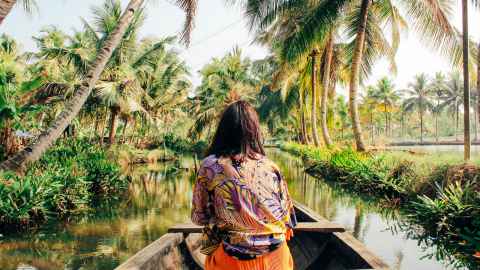Can we rethink tourism sustainably?
5 August 2024
Is sustainable tourism achievable or just a lofty ideal? Doctoral candidate and Three Minute Thesis finalist Claire Beach is exploring the complexities of the tourism industry in her research.

The following is an edited excerpt of a 95bFM Ready Steady Learn interview with Business School doctoral candidate and Three Minute Thesis finalist Claire Beach whose research explores sustainability in tourism.
Tourism is an important industry for New Zealand, can we do it sustainability?
A big issue is what actually is sustainable tourism? There’s debate about whether it can even exist and does that term work because it’s an oxymoron. Many people think the only way to manage things is not to travel.
I think New Zealand’s biggest obstacle is its reliance on private vehicles. When backpackers and other international tourists come here and look for ways to move around the country, the options aren’t great.
We don’t have really good, affordable ways to travel around. And I think tourists are often surprised because New Zealand has this ‘100 percent pure’ campaign and this clean green image. I definitely think there needs to be a lot of development of the train routes, buses, etc.
What conversations are happening around how to do tourism differently?
Some travellers try slow tourism, where they try to stay in one place longer. Others look for locations that have activities on site.
Right before Covid, there was a no-flying movement, and many people were committing to not flying for a year or more.
People also look to companies like Byway (a flight-free travel platform that creates travel packages away from the traditional tourist trails). Others put together peripheral-type trips to avoid heavily touristed areas and go to ‘destination dupes’ to enjoy similar experiences without overcrowding and infrastructure pressures.
What role do consumers’ expectations play in shaping sustainability practices in the tourism industry?
Tonnes. As tourists, we often want highly personalised experiences and a sense of novelty. But this makes sustainability very difficult. And the more bespoke and experiential we get, the less sustainable we will probably be; you might see someone posting their helicopter trip into Fox Glacier on Instagram for example.
As consumers, we also need to consider why we need to travel so much. For example, do you need a better work-life balance? If you created a happier life, might you take fewer trips in a year?

What challenges do businesses face when transitioning to more sustainable practices in the tourism industry?
The biggest hurdle is understanding what we’re actually talking about because the language of sustainability is very vague. And that was kind of intentional.
The 1987 Brundtland Report, a key document in tourism, was created so that all nations at different points of the journey could use the same language. But this meant that there were some misunderstandings. For example, someone might be talking about sustainable tourism, but they’re specifically talking about economic sustainability. This creates confusion, especially for consumers.
Businesses with front-of-house staff also face challenges. Many sustainability-related decisions are made at the top, by the manager. However, employees are tasked with sharing these eco goals with the consumers, which can sometimes cause tension.
What sort of tensions arise?
To give an example, I used to work at a campground, and one of its key selling points in eco-tourism was that it was off grid. However, this meant that it was hard to get a hot shower, and guests would complain.
As employees, we were left to explain that if you’re trying to do good for the environment, you need to regulate water usage. So, shorter showers and less propane mean you may not be as warm as you would like. These are the trade-offs businesses have to face in terms of what the customer wants and sustainability goals.
How do competing sustainability goals create tensions within the tourism industry?
Regarding the shower example, that company had to balance its economic sustainability with attracting consumers and customer satisfaction while also pursuing its environmental goals of water conservation and energy conservation.
If you imagine the three goals of sustainability—environmental, economic, and social—located on different points of a triangle, the further you move towards one, the further away you are from the others. This pull in different directions is the tension that we see and experience.
How can tourism firms measure the success of their sustainability initiatives?
It’s really hard, and it depends on the type of business. For example, a bike company, where they move your luggage around for you while you ride one of the great trails, they’re going to be measuring things like impact on the trails, the fuel required to move the luggage and the shuttles back and forth.
But then a marine wildlife watching company is going to be talking about grey waste and how to get rid of it in a sustainable manner, how they control invasive species in the water, etc.
It’s complex, and many firms in New Zealand lack the skills or resources to dedicate to it. So, we need to see government and industry-driven initiatives pool resources.
Is there anything in the works?
There’s quite a bit of movement. For example, the New Zealand Tourism Sustainability Commitment includes 12 commitments for individual businesses to work towards.
Firms who signed this commitment are supposed to establish and create some sort of plan to help them work towards this. But when you look into it further, they’re still debating what should be measured and how things should be measured; how do we actually compare a boat company to a bicycle company?
What can businesses do to ensure that their sustainability efforts are perceived as genuine?
I think radical transparency is fantastic. As consumers, as humans, we’re all pretty forgiving when we’re honest about what we’re trying to do.
Companies I particularly favour will have at least one or two pages on their website saying we’ve tried this, but it turns out it didn’t work, and now we’re trying this. And they’re very open to this being a long-term process.
I wouldn’t solely trust certifications. There are several certifications in the industry, which is fantastic for consumers, but I think we should look more at how companies communicate. Are they telling you what they’re doing and why they’re doing it?
Media contact:
Sophie Boladeras, media adviser
M: 022 4600 388
E: sophie.boladeras@auckland.ac.nz